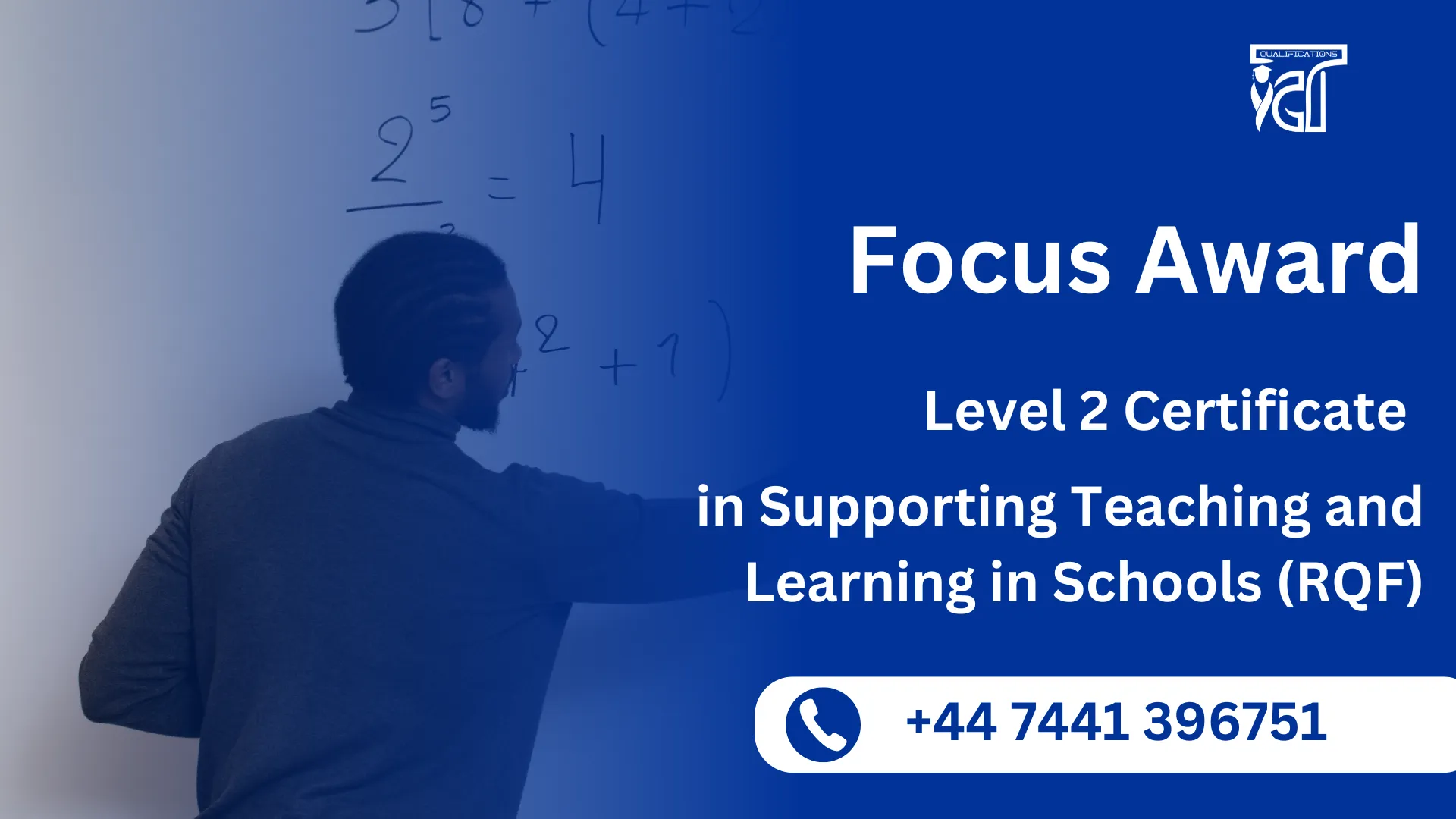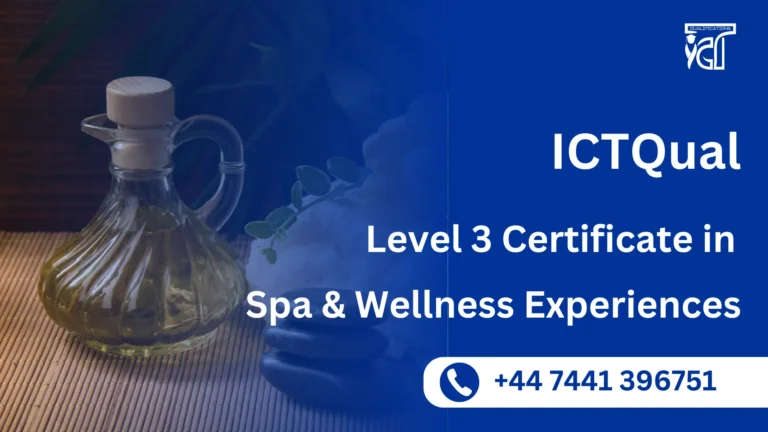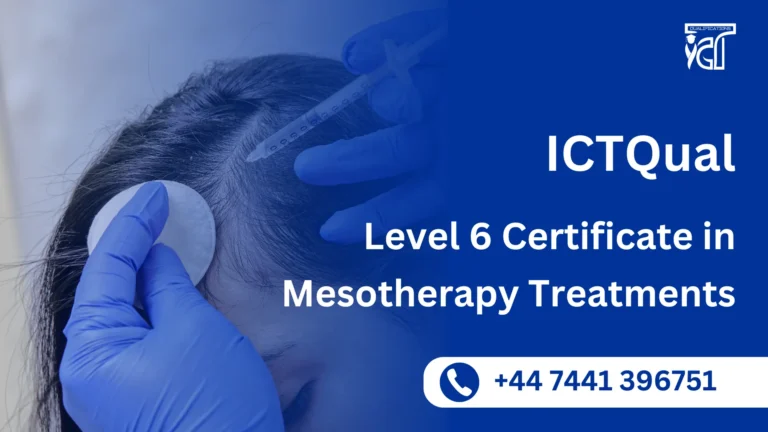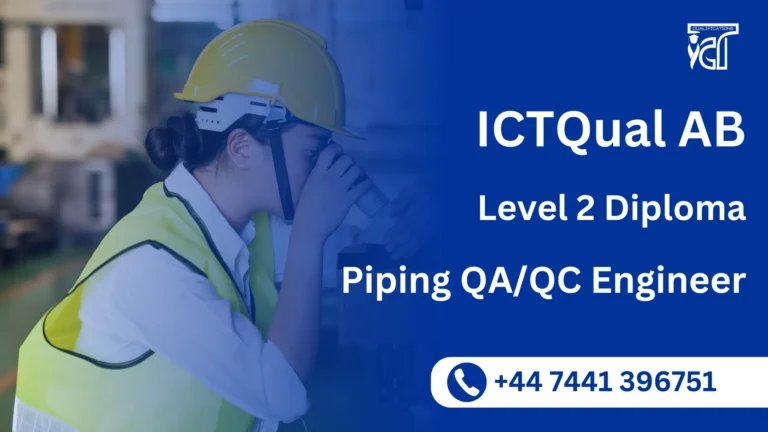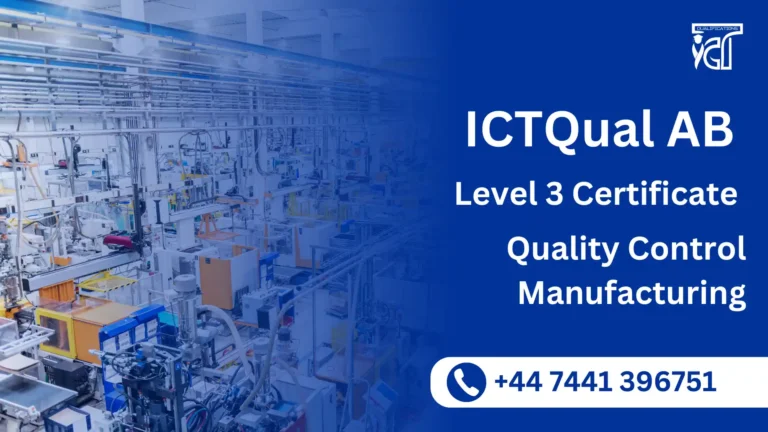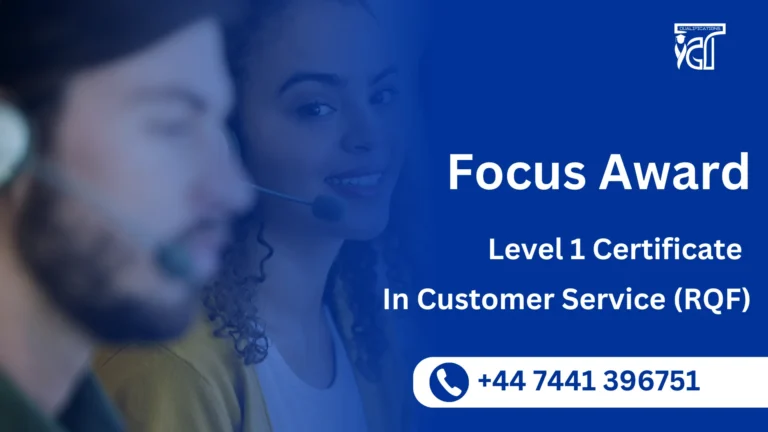If you’re looking to build a career in education or enhance your role as a teaching assistant, the Focus Awards Level 2 Certificate in Supporting Teaching and Learning in Schools (RQF) is an excellent qualification to consider. This course offers you the opportunity to develop the skills and knowledge necessary to support teaching and learning in a school environment. Whether you’re new to the education sector or seeking to formalize your experience, this Ofqual-regulated qualification is recognized by schools and employers across the UK and beyond.
The Focus Awards Level 2 Certificate in Supporting Teaching and Learning in Schools (RQF) is a comprehensive qualification designed for those looking to work or currently working in school-based environments, particularly as teaching assistants or support staff. This course helps learners develop the skills and knowledge necessary to provide effective support in the classroom, ensuring a positive learning experience for students. The qualification is ideal for individuals who are passionate about education and want to contribute to the success of students in primary, secondary, or special educational settings.
As an Ofqual-regulated qualification, the Level 2 Certificate is highly recognized and respected by educational institutions, making it a valuable asset for anyone wishing to pursue a career in education.
The Focus Awards Level 2 Certificate in Supporting Teaching and Learning in Schools (RQF) focuses on the development of key competencies needed to support effective teaching and learning in schools. The qualification covers various aspects of school life, including working with teachers and students, supporting learners with special needs, promoting positive behavior, and understanding the principles of safeguarding.
This qualification is assignment-based and practical, allowing learners to gain real-world experience while completing the course. There are no exams, and assessments are designed to ensure that candidates can apply their learning in a classroom or school environment.
The Focus Awards Level 2 Certificate in Supporting Teaching and Learning in Schools (RQF) is an invaluable qualification for anyone looking to build a rewarding career in education. Whether you’re just starting out or looking to formalize your experience, this qualification provides you with the essential skills to support teaching and learning effectively in schools. Its Ofqual-regulated status, assignment-based assessment approach, and practical focus ensure that learners are well-equipped to make a meaningful impact in the classroom.
By completing this course, you’ll enhance your career prospects, gain essential skills, and be able to contribute positively to the educational development of students. Enroll today and take the next step towards a fulfilling career in supporting teaching and learning in schools!
Focus Awards Level 2 Certificate in Supporting Teaching and Learning in Schools (RQF)
The Focus Awards Level 2 Certificate in Supporting Teaching and Learning in Schools (RQF) qualification, Learners must complete all mandatory units to achieve 24 credits, 3 credits from optional group A and 3 credits from optional group B. Learners will achieve a total of 30 credits.
| Sr# | Unit Title | Credit | GLH |
|---|---|---|---|
| 1 | Child and young person development | 2 | 15 |
| 2 | Safeguarding the welfare of children and young people | 3 | 20 |
| 3 | Communication and professional relationships with children, young people and adults | 2 | 15 |
| 4 | Equality, diversity and inclusion in work with children and young people | 2 | 15 |
| 5 | Help improve own and team practice in schools | 3 | 15 |
| 6 | Maintain and support relationships with children and young people | 3 | 15 |
| 7 | Support children and young people’s health and safety | 3 | 15 |
| 8 | Support children and young people’s positive behaviour | 2 | 15 |
| 9 | Support learning activities | 4 | 25 |
Optional Units:
| Sr# | Unit Title | Credit | GLH |
|---|---|---|---|
| 1 | Schools as organisations | 3 | 20 |
| 2 | Schools as organisations | 3 | 15 |
| 3 | Contribute to supporting bilingual learners | 2 | 12 |
| 4 | Invigilate tests and examinations | 3 | 19 |
| 5 | Prepare and maintain learning environments | 3 | 18 |
| 6 | Provide displays in schools | 3 | 15 |
| 7 | Support assessment for learning | 4 | 20 |
| 8 | Support children and young people at meal or snack times | 3 | 18 |
| 9 | Support children and young people with disabilities and special educational needs | 4 | 26 |
| 10 | Support children and young people’s play and leisure | 3 | 16 |
| 11 | Support children and young people’s travel outside of the setting | 3 | 22 |
| 12 | Support extra-curricular activities | 3 | 15 |
| 13 | Support the use of information and communication technology for teaching and learning | 2 | 12 |
| 14 | Move and position individuals in accordance with their plan of care | 4 | 26 |
| 15 | Provide support for therapy sessions | 2 | 14 |
GLH (Guided Learning Hours) and TQT (Total Qualification Time) are terms commonly used in vocational qualifications to help define the amount of time a learner is expected to spend on their studies.
1. GLH (Guided Learning Hours)
GLH refers to the number of hours a learner spends being directly taught, supervised, or supported during their course. This includes the time spent in activities such as:
- Classroom instruction
- Practical workshops
- One-on-one tutoring or mentoring sessions
- Online learning sessions with tutor support
In other words, GLH represents the time that learners are actively engaged with their instructors or learning activities.
2. TQT (Total Qualification Time)
TQT represents the total amount of time a learner is expected to invest in completing a qualification, including:
- GLH (Guided Learning Hours): Time spent on direct learning, as explained above.
- Self-Directed Learning: This includes time spent on independent study, research, assignment completion, preparation for exams, and any other work the learner does outside of direct teaching hours.
TQT is a broader measure that includes all the time required to achieve the qualification. It helps learners and employers understand the overall commitment required for the qualification.
Key Differences Between GLH and TQT:
- GLH focuses on direct learning with guidance or supervision.
- TQT includes GLH as well as independent study time and other learning-related activities.
Example:
If a qualification has a TQT of 600 hours and a GLH of 250 hours, it means the learner should spend 250 hours in direct learning (classroom, online, or tutor-led sessions) and 350 hours on independent study or research.
Learning Outcomes for the Focus Awards Level 2 Certificate in Supporting Teaching and Learning in Schools (RQF)
Here are the learning outcomes associated with each of the study units for the Focus Awards Level 2 Certificate in Supporting Teaching and Learning in Schools (RQF):
1. Child and Young Person Development (2 credits, 15 GLH)
- Understand the developmental stages of children and young people.
- Identify factors that influence the development of children and young people.
- Recognize the impact of developmental changes on children’s behavior and learning.
2. Safeguarding the Welfare of Children and Young People (3 credits, 20 GLH)
- Understand the principles and importance of safeguarding in a school setting.
- Identify signs and symptoms of abuse and neglect.
- Understand how to respond appropriately to safeguarding concerns and report them.
- Recognize the importance of promoting children’s well-being and protection.
3. Communication and Professional Relationships with Children, Young People, and Adults (2 credits, 15 GLH)
- Understand the key principles of communication in professional settings.
- Develop effective communication skills when working with children, young people, and adults.
- Build and maintain professional relationships that support positive learning environments.
- Use appropriate communication methods for different individuals and situations.
4. Equality, Diversity, and Inclusion in Work with Children and Young People (2 credits, 15 GLH)
- Understand the importance of equality, diversity, and inclusion in educational settings.
- Promote an inclusive environment that celebrates diversity and respects individuals’ differences.
- Identify and challenge discriminatory behavior in educational settings.
- Support children and young people in understanding equality and diversity.
5. Help Improve Own and Team Practice in Schools (3 credits, 15 GLH)
- Reflect on personal and professional development in the context of school settings.
- Identify areas for improvement and implement strategies to enhance own practice.
- Work collaboratively with the team to improve the overall quality of teaching and support.
- Participate in team discussions and contribute to improving school practices.
6. Maintain and Support Relationships with Children and Young People (3 credits, 15 GLH)
- Establish and maintain positive relationships with children and young people.
- Recognize the importance of building trust and respect in relationships with learners.
- Support children and young people in overcoming personal or academic challenges.
- Provide emotional and social support to ensure a positive learning experience.
7. Support Children and Young People’s Health and Safety (3 credits, 15 GLH)
- Understand health and safety procedures within the school setting.
- Support children and young people in maintaining a safe environment.
- Recognize and address potential hazards or risks that may impact health and safety.
- Implement safety measures to protect children and young people in various activities.
8. Support Children and Young People’s Positive Behaviour (2 credits, 15 GLH)
- Understand strategies for promoting positive behavior in children and young people.
- Identify the causes of challenging behavior and how to address them.
- Support the development of social and emotional skills to encourage positive behavior.
- Implement behavior management techniques in a professional and supportive manner.
9. Support Learning Activities (4 credits, 25 GLH)
- Support teachers in the preparation and delivery of learning activities.
- Help adapt learning activities to meet the individual needs of students.
- Observe and assist in monitoring student progress during learning activities.
- Assist in the evaluation and assessment of learning outcomes.
Optional Units
10. Schools as Organisations (3 credits, 20 GLH)
- Understand the structure and function of schools as organizations.
- Recognize the roles and responsibilities of different staff members within a school.
- Explore the relationship between schools and other organizations in the educational sector.
11. Contribute to Supporting Bilingual Learners (2 credits, 12 GLH)
- Understand the needs of bilingual learners in educational settings.
- Implement strategies to support language development in bilingual students.
- Recognize challenges and opportunities associated with bilingual education.
12. Invigilate Tests and Examinations (3 credits, 19 GLH)
- Understand the role and responsibilities of an exam invigilator.
- Implement procedures for ensuring exams are conducted according to regulations.
- Provide support to students during examinations and maintain a fair testing environment.
13. Prepare and Maintain Learning Environments (3 credits, 18 GLH)
- Prepare a conducive learning environment by organizing resources and materials.
- Maintain a clean and safe classroom environment.
- Ensure that learning spaces are supportive of different learning styles and needs.
14. Provide Displays in Schools (3 credits, 15 GLH)
- Plan, create, and maintain educational displays in classrooms or communal areas.
- Use displays to enhance learning and create an engaging environment.
- Ensure that displays are appropriate and relevant to the curriculum and age group.
15. Support Assessment for Learning (4 credits, 20 GLH)
- Understand the principles and methods of formative assessment in schools.
- Assist teachers in gathering data on students’ learning progress.
- Support learners by providing constructive feedback that aids their development.
16. Support Children and Young People at Meal or Snack Times (3 credits, 18 GLH)
- Support children during mealtimes and ensure their safety and well-being.
- Encourage positive eating habits and promote healthy choices.
- Provide assistance as necessary during meal and snack times in educational settings.
17. Support Children and Young People with Disabilities and Special Educational Needs (4 credits, 26 GLH)
- Understand the specific needs of children and young people with disabilities and SEN.
- Provide targeted support to enable these learners to access the curriculum.
- Implement strategies to promote inclusion and encourage full participation.
18. Support Children and Young People’s Play and Leisure (3 credits, 16 GLH)
- Support children in engaging with play and leisure activities that promote social development.
- Understand the importance of play for cognitive and emotional development.
- Facilitate access to safe and appropriate play activities.
19. Support Children and Young People’s Travel Outside of the Setting (3 credits, 22 GLH)
- Support students when traveling outside the school setting, ensuring their safety and well-being.
- Assist with organizing transport and managing risks during off-site activities.
- Promote positive behavior and engagement during off-site learning experiences.
20. Support Extra-Curricular Activities (3 credits, 15 GLH)
- Assist in the planning and delivery of extra-curricular activities for students.
- Support students’ participation in sports, clubs, or other school-based activities.
- Ensure that activities are safe, inclusive, and aligned with educational objectives.
21. Support the Use of Information and Communication Technology for Teaching and Learning (2 credits, 12 GLH)
- Assist in the use of technology to support teaching and learning.
- Help learners access and use digital resources effectively in their studies.
- Ensure that students are using technology safely and responsibly.
22. Move and Position Individuals in Accordance with Their Plan of Care (4 credits, 26 GLH)
- Understand safe moving and positioning techniques for children and young people.
- Follow specific care plans to assist individuals with mobility needs.
- Ensure the safety and comfort of children and young people during physical support.
23. Provide Support for Therapy Sessions (3 credits, 15 GLH)
- Support children and young people during therapy sessions, such as physical or occupational therapy.
- Understand the therapeutic goals and how to assist in achieving them.
- Ensure the well-being of children and young people during therapy and support their engagement.
Benefits of the Focus Awards Level 2 Certificate in Supporting Teaching and Learning in Schools (RQF)
The Focus Awards Level 2 Certificate in Supporting Teaching and Learning in Schools (RQF) offers a wide range of benefits for individuals looking to work or advance in the education sector. Whether you’re new to the field or want to formalize your experience, this qualification equips you with essential skills and knowledge for a successful career in school-based roles. Below are the key benefits of this course:
1. Ofqual-Regulated Qualification
- The Focus Awards Level 2 Certificate is an Ofqual-regulated qualification, meaning it is recognized by employers, schools, and educational institutions across the UK and internationally. This regulated status ensures that your qualification meets high educational standards and is trusted by employers.
2. Career Advancement
- This qualification is perfect for individuals who wish to pursue a career as a teaching assistant, learning support assistant, or special educational needs (SEN) assistant. By completing this course, you can significantly improve your chances of gaining employment in a school setting.
- If you are already working in an educational environment, the Level 2 Certificate will enhance your career progression by giving you the official recognition of your skills and knowledge.
3. No Exams – Assignment-Based Learning
- The Focus Awards Level 2 Certificate is entirely assignment-based, allowing you to complete tasks that are directly relevant to your role in the classroom. This means you can learn at your own pace and apply your learning in real-world scenarios. There are no exams, making the course more accessible for individuals who prefer practical assessment methods.
4. Develop Practical Skills
- This qualification focuses on the development of practical skills needed to support teaching and learning effectively in the classroom. You’ll gain valuable experience in assisting with learning activities, managing behavior, supporting children’s health and safety, and maintaining positive relationships with students.
- The skills learned in this course will directly impact your ability to make a difference in students’ academic and personal development, preparing you to handle real-life challenges in the classroom.
5. Support for Diverse Student Needs
- The course covers critical topics such as safeguarding, positive behavior management, and support for special educational needs (SEN). These areas are essential for creating an inclusive learning environment where all students, regardless of their background or challenges, can thrive.
- By gaining expertise in these areas, you’ll be better equipped to support students from diverse backgrounds, ensuring that they receive the care and guidance they need to succeed.
6. Gain Knowledge of the Education System
- You’ll acquire a deeper understanding of how schools operate, from the structure of the educational system to the roles of teaching staff and support personnel. This knowledge is invaluable for anyone seeking a career in education and will help you navigate the complexities of a school environment with confidence.
7. Worldwide Recognition
- The Focus Awards Level 2 Certificate is recognized internationally, meaning it can open doors to career opportunities not just in the UK, but also in other countries where there is a demand for skilled educational support staff.
- This makes the qualification ideal for individuals considering a career abroad in the education sector.
8. Flexible Learning
- The course offers flexible learning options, allowing you to study in a way that suits your lifestyle. As it is assignment-based, you can balance your studies with other personal and professional commitments.
- This flexibility makes it ideal for individuals who are already working in schools or other related fields and wish to upskill or formalize their experience without the need for taking time off work.
9. Enhance Personal Development
- Throughout the course, you’ll gain a deeper understanding of child development, communication techniques, and behavior management strategies, which will enhance your ability to work effectively with children and young people.
- The personal growth achieved through this qualification will not only boost your professional confidence but also help you develop valuable soft skills, such as empathy, patience, and problem-solving abilities, which are essential for a successful career in education.
10. Foundation for Further Education and Career Progression
- Completing the Level 2 Certificate can serve as a stepping stone to higher-level qualifications, such as the Level 3 Certificate in Supporting Teaching and Learning in Schools or the Level 3 Diploma in Specialist Support for Teaching and Learning in Schools.
- This provides a clear pathway for career progression, allowing you to further specialize in areas such as special educational needs (SEN) or behavior management, and take on more advanced roles in schools.
11. Meet Industry Standards
- The Focus Awards Level 2 Certificate provides the knowledge and skills that meet industry standards for working with children and young people. It ensures you are fully equipped to support the delivery of the curriculum and assist with the overall development of students.
12. Contribute to a Positive Educational Environment
- By gaining the skills to effectively support teaching and learning, you will contribute to a positive and inclusive educational environment. You will be an integral part of the learning process, helping students reach their full potential while fostering a supportive and engaging atmosphere.
Best Fit for the Focus Awards Level 2 Certificate in Supporting Teaching and Learning in Schools (RQF)
The Focus Awards Level 2 Certificate in Supporting Teaching and Learning in Schools (RQF) is ideal for individuals who are passionate about supporting the educational development of children and young people. Here’s who will benefit the most from this course:
1. Aspiring Teaching Assistants
- If you are looking to start a career in education as a teaching assistant or learning support assistant, this course is the perfect foundation. It equips you with the fundamental knowledge and skills needed to effectively assist teachers in delivering lessons and supporting students in their learning journey.
2. Current Support Staff Seeking Formal Qualification
- For individuals already working as support staff in schools, this qualification will formalize your experience and provide you with the recognized certification required for career advancement. It will enhance your professional standing and boost your confidence in performing day-to-day duties in educational settings.
3. Those Interested in Special Educational Needs (SEN) Support
- If you are interested in working with students with special educational needs (SEN) or learning difficulties, this course is ideal. It includes units on supporting children with disabilities, special educational needs, and ensuring an inclusive learning environment for all students, which will prepare you for working in SEN support roles.
4. Individuals Seeking a Career in Childcare and Education
- This course is also suitable for those who have an interest in the broader field of childcare and want to pursue a career in educational support. Whether you’re working in a school, after-school program, or special needs setting, this qualification provides a comprehensive understanding of child development, safeguarding, and educational support.
5. Those Seeking a Career Change into Education
- If you’re looking to transition into education from another sector, the Level 2 Certificate offers an excellent entry point. It provides the essential skills and knowledge to start working in schools, giving you the foundation to build a fulfilling career in education and child development.
6. Those Who Wish to Pursue Further Education in Education and Childcare
- If you’re considering advancing your career in the education sector, this course can serve as a stepping stone to further qualifications, such as the Level 3 Certificate or Diploma in Supporting Teaching and Learning in Schools. It provides the foundational knowledge needed for more specialized roles in schools.
7. Individuals Looking for Flexible Study Options
- The assignment-based structure of the course makes it ideal for those who want to study at their own pace, allowing for flexibility in balancing work, study, and personal commitments. If you’re already employed or have family commitments, this course offers the flexibility to study without disrupting your routine.
8. Anyone Passionate About Child Welfare and Education
- This qualification is best suited for individuals who have a genuine passion for working with children and making a positive impact on their educational experiences. If you’re committed to creating a safe, supportive, and inclusive learning environment, this course will provide you with the tools to make a difference in the classroom.
Entry Requirements
Register Now
Qualification Process
Qualification Process for the Focus Awards Level 2 Certificate in Supporting Teaching and Learning in Schools (RQF)
- Self-Assessment:
Begin by evaluating your eligibility to ensure you meet the qualification requirements, including work experience, knowledge, and language proficiency. - Registration:
Complete your registration by submitting the required documents, including a scanned copy of a valid ID, and paying the registration fee. - Induction:
An assessor will conduct an induction to confirm your eligibility for the course and explain the evidence requirements. If you do not meet the criteria, your registration will be canceled, and the fee will be refunded. - Assignmnets & Evidence Submission:
Provide all assignmnets and the necessary evidence based on the assessment criteria outlined in the course. If you are unsure of the required evidence, consult with the assessor for guidance on the type and nature of evidence needed. - Feedback and Revision:
The assessor will review your submitted evidence and provide feedback. Evidence that meets the criteria will be marked as “Criteria Met,” while any gaps will be identified. You will be asked to revise and resubmit if needed. - Competence Evidence:
Submit final evidence demonstrating that all learning outcomes have been met. This evidence will be marked as “Criteria Met” by the assessor once it is satisfactory. - Internal Quality Assurance (IQA):
The Internal Quality Assurance Verifier (IQA) will review your evidence to ensure consistency, quality, and compliance with standards. - External Verification:
The IQA will submit your portfolio to Focus Award External Quality Assurance Verifiers (EQA) for final confirmation. The EQA may contact you directly to verify the authenticity of your evidence. - Certification:
Upon successful completion of all checks, FOCUS AWARD will issue your official certificate, confirming that you have attained the Focus Awards Level 2 Certificate in Supporting Teaching and Learning in Schools (RQF).

